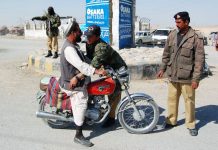
Peshawar (by Ashrafuddin Pirzada): From Quetta to Peshawar, Zarif from the Zabul province in Afghanistan has lived,toiled and traveled in search of a new identity – one that would keep him here in Pakistan.
A taxi driver, Zarif – not his real name – originally came to Pakistan during the fourth wave of refugee influx from Afghanistan post Sept 11. The first was in the wake of Russian occupation of Afghanistan in 1979, the second in 1992 after the Red Army withdrew from the country and a civil war between Afghan warlords started for control of Kabul. The third refugee influx came post Taliban takeover of Kabul in the nineties.
“I have lived in Quetta for years before moving to Peshawar when i was told i could secure an identity card here,” Zarif told News Lens. He has been driving a taxi here for years now but lately he avoids travelling to the cantonment area. “I couldn’t get a Pakistani identity card but i have my proof of registration card that allows me stay in Pakistan till December 2015. But the police harasses us when we go to the city or cantonment area.”
Authorities in the Khyber Pakhtunkhwa (KP) and Balochistan provinces that host most of the Afghan refugees have taken an increasingly stringent stance towards them since the Army Public School terrorist attack that killed 148 people, most of them children. The terrorist attack was claimed by Tehrik-e-Taiban and coordinated from Afghanistan.
An immediate outcome of this stance are the crackdowns all over the two border provinces against unregistered foreigners including Afghan nationals. Unprecedented security arrangements such as check-posts have been established at numerous sites within cities, at all entry and exit points to the tribal areas and other public places to monitor those without valid traveling or residency documents.
Sayeed Shahab Ali Shah, Political Agent Khyber Agency told News Lens that they have deported 3,940 Afghan nationals during the month of February. The Afghans were arrested in various raids and crackdowns conducted by law enforcing agencies, he said. “Everyday we arrest unregistered Afghan nationals and send them back to Afghanistan after investigation,” said Shah.
“After verification from various sources we register cases against illegal Afghans and until they decide to deport them, we put them in jail,” said Shah. If an Afghan is found involved in anti-state activities, the authorities put him through further investigation, he added.
Along with ordinary Afghan citizens, officials of Peshawar police also claim to have arrested at least 450 imams(prayer leaders) of mosques of Afghan origin. The were arrested from different areas of KP and have been deported to Afghanistan in the wake of reports from intelligence agencies.
According to the Senior Superintendent of Police Operations Wing, Dr Mian Saeed, thousands of Afghans living without proper documents were arrested in different search operations in the city after the Army Public School (APS) attack.
The police official said: “Not just in KP, illegal migrants including 6,333 illegal Afghan refugees have been deported so far from the territorial jurisdiction of Mirpur in Azad Kashmir.”
The arrested Afghans were shifted from Mirpur to Peshawar and onwards to the Torkham border in buses to be handed to Afghan border authorities.
“A grand operation to deport illegal foreign nationals, comprising unregistered Afghan refugees, is in full swing in all parts of KP,” said the police official.
Senior Superintendent of Police Raja Irfan Salim told media in a briefing that a total of 12,400 Afghan nationals were found in various parts of the Mirpur district. He said 6,500 of them did not have relevant documents.
A total of 5,900 Afghan refugees, said Salim, living in the district the Proof of Registration (PoR) cards issued by the National Database and Registration Authority (NADRA), allowing them to stay in Pakistan till December 31, 2015.
An Afghan businessman who deals in electronic appliances in the Karkhano Market in Hayatabad Peshawar told News Lens Pakistan that Afghans had invested billions of rupees in businesses here.
Requesting not to be named due to security reasons, he said: “I am involved in import and export business since 1992 and have various offices in different cities in Pakistan. The government should give me credit for my contribution to the economy and give me nationality of Pakistan.”
However, he said, there were many of Afghans who created a law and order situation for Pakistan “who should be punished”, he said.
“It is a matter of serious concern because there are around 4 million Afghan refugees in Pakistan living here for the last 35 years,” said Shams Ghani, a social worker. “It is a great challenge for the government to round up the scattered Afghans with all their different races, ethnicities and cultural backgrounds.”
Ghani said Afghans residing in the border regions would be easy to identify, repatriate or deport but those born and married here to Pakistani men and women would be hard to locate.
In recent months, Afghans have protested in the cities of Peshawar,Bunnu and Azaad Kashimir, asking the Pakistani government to allow them to stay. They demanded permanent residency as some of them had been living in Pakistan for more than 40-years.
Political activists and civil society members say that government officials themselves issued thousands of Computerized National Identity Cards(CNIC) to the Afghan citizens for a price. They accuse NADRA officials of corruption saying many have become millionaires taking bribes from Afghan nationals for Pakistani identity cards.
When contacted, Wahab, a NADRA employee said that his organization had blocked more than ten thousand Pakistani national Identity cards. He said NADRA was coordinating with other government departments to create a database of Afghan nationals who obtained Pakistani cards through fraud.
For the last two months, the KP government and FATA administrations have been registering Afghans to compile a database for unregistered Afghans and other nationalities.
Owners of the houses rented to Afghan citizens have been asked to record their data with the nearest police station and agency administration offices.
The government has also announced that Afghan nationals, both registered or not, would be confined to camps. While the authorities have issued a notification in this regard, there hasn’t been any progress in this regard yet.
According to the Khyber Pakhtunkhwa government, more than 1.5 million Afghan refugees live in KP, engaged in small and big businesses. According to the police, Afghan nationals were found guilty in various unlawful acts – from minor anti-state activities to a big terrorism related incidents like the APS attack.



